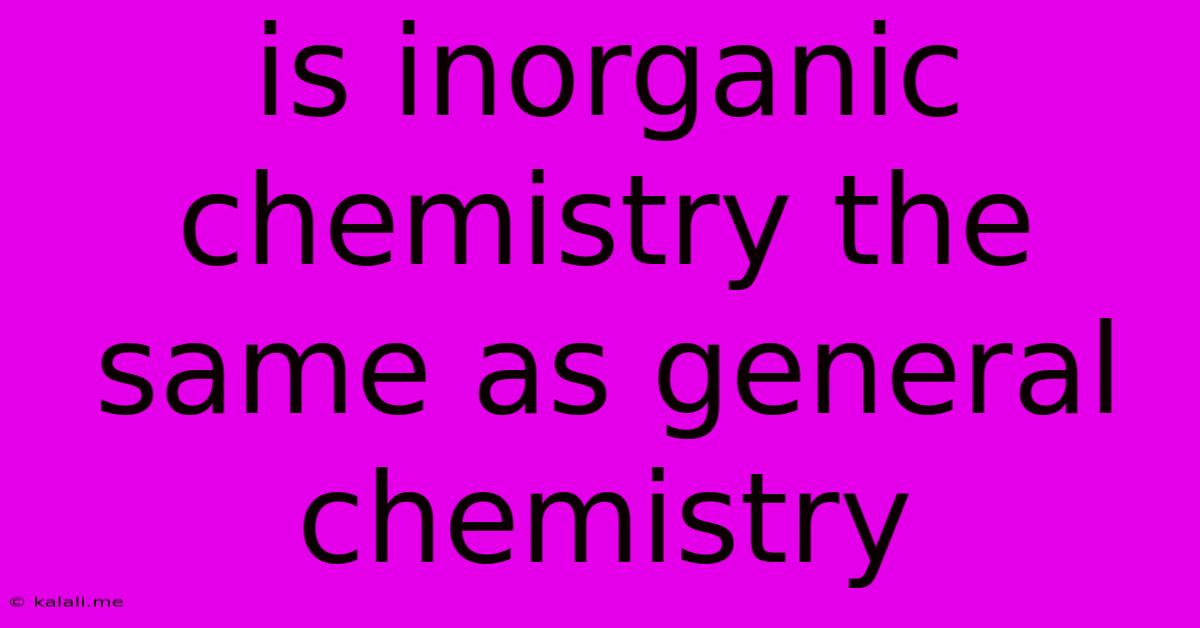Is Inorganic Chemistry The Same As General Chemistry
Kalali
May 10, 2025 · 3 min read

Table of Contents
Is Inorganic Chemistry the Same as General Chemistry? A Clear Distinction
Meta Description: Many students confuse inorganic chemistry with general chemistry. This article clarifies the key differences between these two crucial chemistry branches, outlining their scope, focus, and learning objectives.
General chemistry and inorganic chemistry are often mistakenly used interchangeably, particularly by students new to the field. While they are related, they are distinct branches of chemistry with different focuses and levels of detail. This article aims to clarify the key differences between general chemistry and inorganic chemistry.
Understanding General Chemistry
General chemistry provides a foundational overview of core chemical principles. It acts as a broad introduction, covering a wide range of topics necessary for understanding more specialized areas. Think of it as the base layer upon which all other chemistry branches are built. Key subjects typically included are:
- Fundamental concepts: This includes the scientific method, measurement, significant figures, and dimensional analysis – the building blocks of all scientific inquiry.
- Atomic structure and bonding: Exploring the structure of atoms, the periodic table, and various types of chemical bonds (ionic, covalent, metallic).
- Stoichiometry: Calculations involving chemical reactions and quantities of reactants and products.
- States of matter: Understanding solids, liquids, and gases, and the transitions between them.
- Solutions and equilibrium: Concepts of solubility, concentration, and chemical equilibrium.
- Thermodynamics: The study of energy changes in chemical reactions.
- Acids and bases: Defining acids and bases, and exploring their reactions.
- Introduction to Organic and Inorganic Chemistry: A brief overview of these specialized fields, setting the stage for further study.
Essentially, general chemistry equips students with the fundamental language and tools needed to understand chemical phenomena. It's a comprehensive yet introductory course.
Delving into Inorganic Chemistry
Inorganic chemistry, on the other hand, focuses specifically on the properties and behavior of inorganic compounds. These are compounds that do not contain carbon-hydrogen bonds (with some exceptions like carbon oxides and carbides). It delves much deeper into the specifics of:
- Coordination chemistry: The study of metal complexes and their reactions. This includes ligand field theory and electron transfer processes, critical in areas like catalysis and materials science.
- Main group chemistry: Exploring the properties and reactivity of elements and their compounds from the s and p blocks of the periodic table. This covers a wide range of compounds and reaction mechanisms.
- Transition metal chemistry: Focusing on the d-block elements, their unique electronic configurations, and their diverse oxidation states. This is crucial for understanding catalysis and materials science.
- Solid-state chemistry: The study of the structure and properties of crystalline solids, including metals, semiconductors, and ceramics.
- Organometallic chemistry: A bridging area between inorganic and organic chemistry, focusing on compounds containing metal-carbon bonds. This field is vital for catalysis and synthesis.
Inorganic chemistry is significantly more specialized and mathematically intensive than general chemistry. It builds upon the foundational knowledge gained in general chemistry but explores the complexities of inorganic systems in greater depth.
The Key Differences Summarized
| Feature | General Chemistry | Inorganic Chemistry |
|---|---|---|
| Scope | Broad introduction to core chemical principles | Specialized study of inorganic compounds |
| Focus | Foundational concepts and general principles | Properties, reactivity, and synthesis of inorganic compounds |
| Depth | Introductory level | Advanced level, often mathematically intensive |
| Compounds | Covers both organic and inorganic compounds (briefly) | Focuses primarily on inorganic compounds |
| Applications | Provides a base for many scientific disciplines | Supports materials science, catalysis, etc. |
In short, general chemistry is a prerequisite for inorganic chemistry. It lays the groundwork, while inorganic chemistry builds upon that foundation to explore the fascinating world of inorganic compounds and their diverse applications. They are not the same; rather, they are sequential and complementary branches of the broader field of chemistry.
Latest Posts
Latest Posts
-
Which Is Larger The Mediterranean Or The North Sea
Jul 13, 2025
-
What Day Is In The Middle Of The Year
Jul 13, 2025
-
How Much Is 100g Of Cream Cheese
Jul 13, 2025
-
Is A Liter Larger Than A Quart
Jul 13, 2025
-
How To Suck On Your Own Boobs
Jul 13, 2025
Related Post
Thank you for visiting our website which covers about Is Inorganic Chemistry The Same As General Chemistry . We hope the information provided has been useful to you. Feel free to contact us if you have any questions or need further assistance. See you next time and don't miss to bookmark.